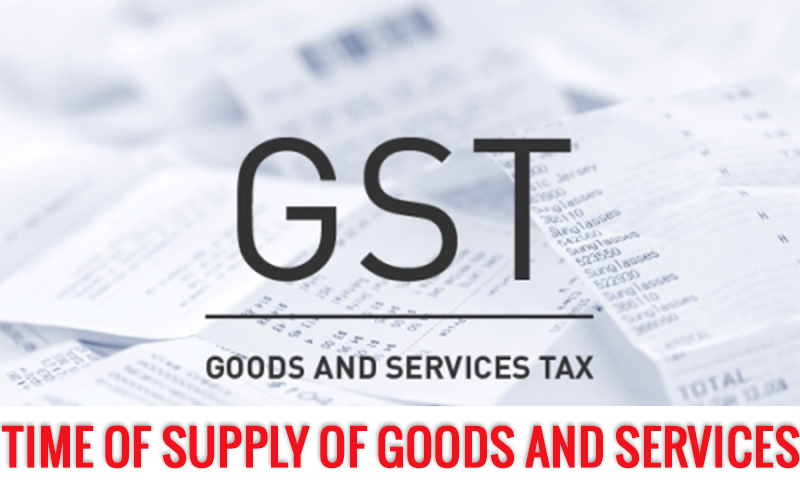INTRODUCTION
The concept of time of supply plays a crucial role in determining the tax liability of suppliers under the Goods and Services Tax (GST) law. It refers to the point in time when goods are deemed to be supplied or services are deemed to be provided, which is essential for determining when the taxpayer is liable to pay taxes. The time of supply varies for goods and services and is determined by specific provisions outlined in the CGSTAct, 2017 and the IGSTAct, 2017.
TIME OF SUPPLY FOR GOODS
Under normal charge, the time of supply for goods is determined as the earlier of the following dates:
- Date of issuing of invoice (or the last day by which the invoice should have been issued): If the supply involves the movement of goods, the invoice should be issued before or at the time of removal of goods for supply to the recipient. If there is no movement of goods, the invoice should be issued before or at the time of delivery of goods or making them available to the recipient.
- Date of receipt of payment: The time of supply can also be the date on which the supplier receives the payment from the recipient.
It's important to note that the supply is assumed to be made to the extent it is covered by the invoice or the payment. Additionally, if the supplier receives an amount up to Rs. 1,000 in excess of the invoice amount, the time of supply for the extra amount can be the date of issue of the invoice at the option of the supplier.
In case of reverse charge, where the recipient of goods is liable to pay tax, the time of supply shall be the earliest of the following dates:
- Date of receipt of goods
- Date of payment as entered in the books of accounts of the recipient or the date on which the payment is debited in his bank account, whichever is earlier
- Date immediately following 30 days from the date of issue of invoice by the supplier
If it is not possible to determine the time of supply using the above methods, the time of supply shall be the date of entry of the transaction in the books of accounts of the recipient.
TIME OF SUPPLY FOR SERVICES
For services, the time of supply is determined based on the provisions outlined in Section 13 of the CGST Act, 2017. The time of supply for services is as follows:
- Invoice is issued in a timely manner: The time of supply shall be the earlier of the date of issue of invoice by the supplier or the date of receipt of payment.
- Invoice is not issued in a timely manner: In cases where the invoice is not issued within the prescribed time frame, the time of supply shall be the earlier of the date of provision of service or the date of receipt of payment.
If the above provisions cannot determine the time of supply, it shall be the date on which the recipient shows the receipt of services in his books of account.
TIME OF SUPPLY FOR VOUCHERS
In the case of the supply of vouchers, the time of supply is determined as follows:
- Supply is identifiable at the point of issuance of the voucher: The time of supply shall be the date of issue of the voucher.
- Supply is not identifiable at the point of issuance of the voucher: In all other cases, the time of supply shall be the date of redemption of the voucher.
RESIDUAL PROVISIONS
If it is not possible to determine the time of supply using the above provisions, the time of supply shall be as follows:
- Periodical return has to be filed: The time of supply shall be the due date of filing the return.
- CGST/SGST is paid: In all other cases, the time of supply shall be the date on which the CGST/SGST is paid.
CONCLUSION
The time of supply is a crucial aspect of the GST law as it determines the point at which tax liability arises for suppliers. It is essential for businesses to understand the provisions related to time of supply for goods and services to ensure compliance with the GST law. By adhering to the guidelines outlined in the CGST Act, businesses can accurately determine the time of supply and fulfill their tax obligations in a timely manner.
Additional Information: Three events to determine the time of supply
From the following 3 events, whichever is earlier can be determined as the date for the time of supply of goods and services under the GST law. The events are as follows:
- Issuing an invoice
- Receiving payment
- Completing the services

